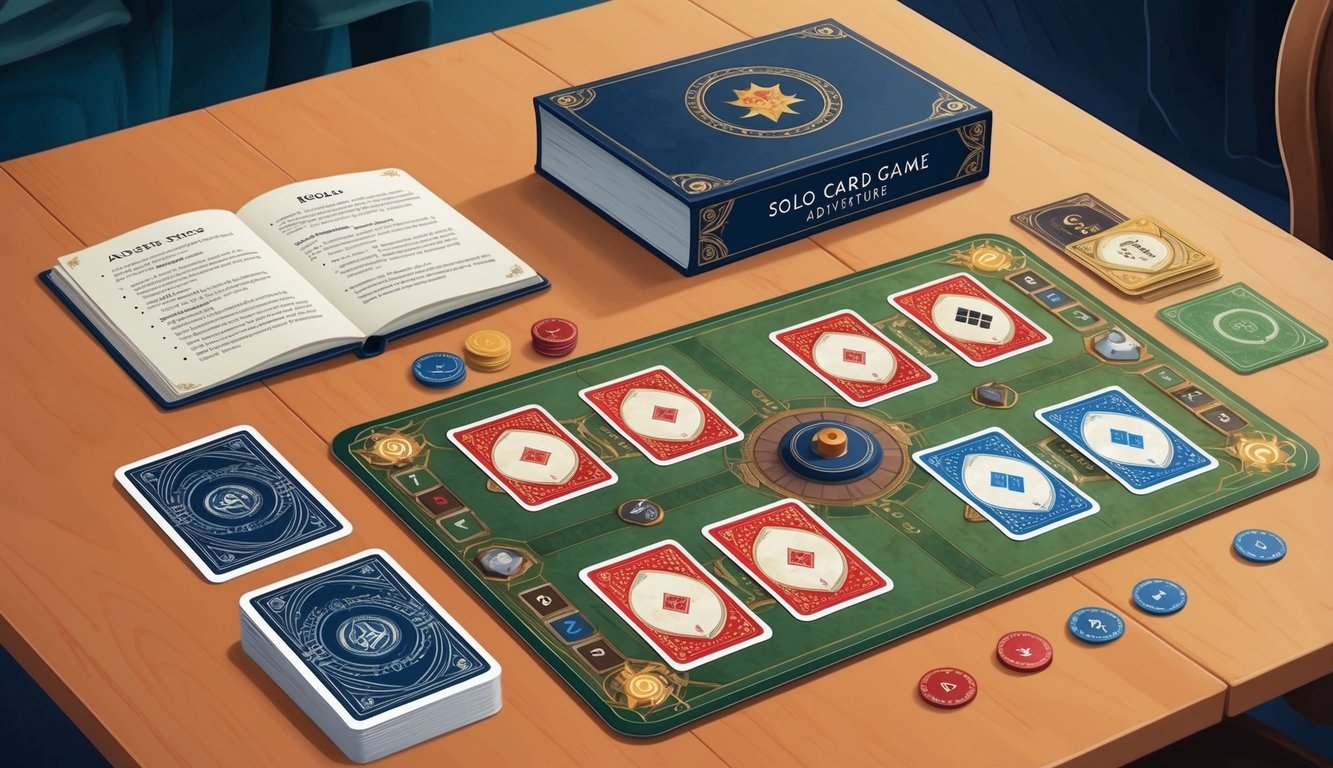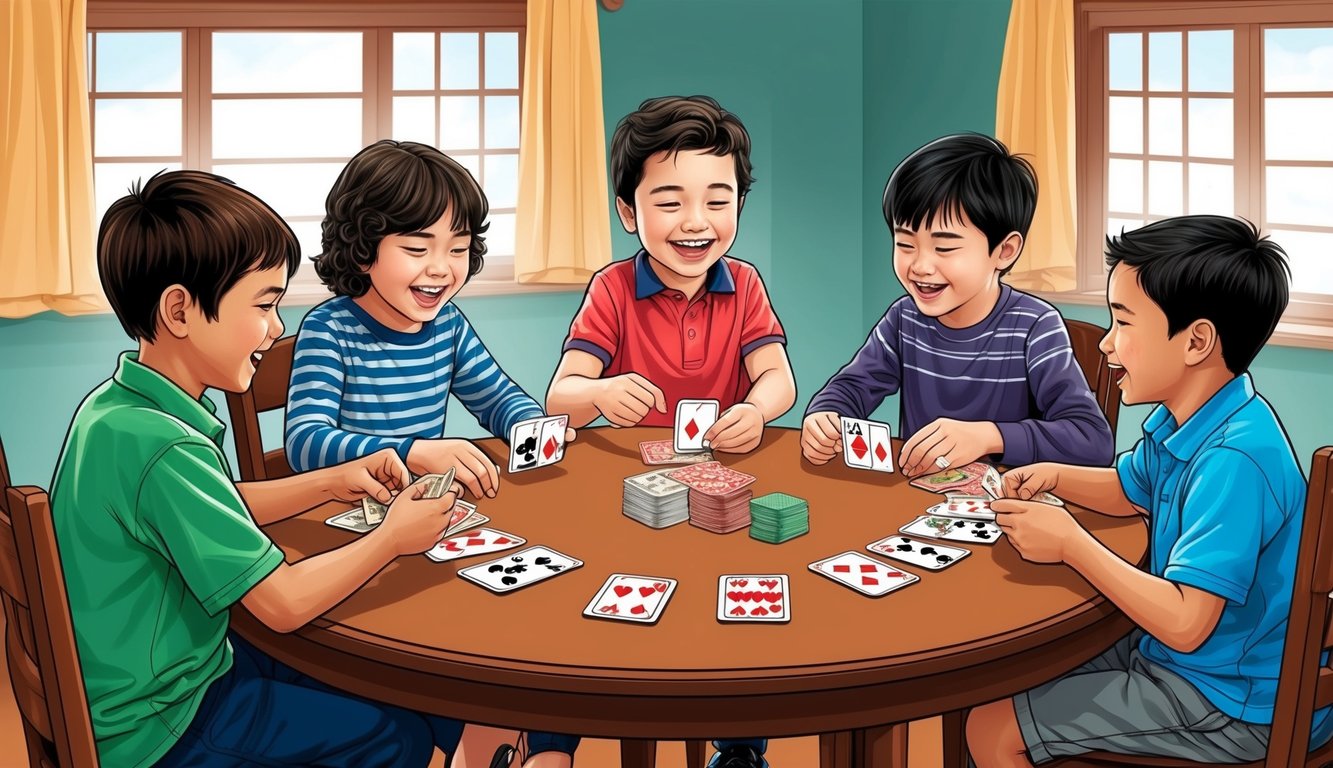Card games have been a staple of family gatherings and social events for generations.
Whether you’re looking to pass the time on a rainy day or spice up your next game night, traditional card games offer endless entertainment.
From classic favorites like Poker and Bridge to simpler games like Go Fish and Crazy Eights, there’s something for everyone in the world of card games.

A standard 52-card deck opens up a world of possibilities, with hundreds of games to choose from that cater to all ages and skill levels. You’ll find games that test your strategy, rely on luck, or require a mix of both.
Some games are perfect for two players, while others can accommodate large groups.
The beauty of traditional card games lies in their simplicity and accessibility – all you need is a deck of cards and a willing partner or group to get started.
Learning new card games can be a fun way to challenge yourself and bond with friends and family.
You might discover a hidden talent for bluffing in Poker or develop a knack for quick mental math in Cribbage.
Many of these games have rich histories and cultural significance, adding an extra layer of interest as you play.
So grab a deck, shuffle up, and deal yourself into the exciting world of traditional card games.
The Origins of Traditional Card Games
Card games have a rich history spanning centuries and cultures.
Their evolution from simple pastimes to complex strategic games reflects changing societies and technologies.

Evolution of Playing Cards
You might be surprised to learn that playing cards originated in China during the Tang dynasty, around 600-900 AD.
These early cards were used for fortune-telling and games.
As trade routes expanded, cards spread to Persia, Egypt, and eventually Europe in the 14th century.
European cards took on the familiar suits we know today – hearts, diamonds, clubs, and spades.
The French introduced the 52-card deck in the 1500s, which became the standard worldwide.
Cultural Impact of Card Games
Card games quickly became a popular pastime across social classes.
You could find nobles and commoners alike enjoying a game of cards.
Different cultures developed their own unique games and traditions.
In America, poker emerged as a quintessential card game in the 1800s.
Bridge gained popularity in the early 20th century, becoming a favorite among the upper classes.
Card games have influenced language and literature too.
Phrases like “ace up your sleeve” or “play your cards right” are now common idioms.
They’ve also inspired countless books and films, cementing their place in pop culture.
Understanding Playing Cards
Playing cards are the foundation of countless games and activities.
They come in various designs and configurations, but share common elements that make them versatile and easy to use.
Components of a Card Deck
A standard deck consists of 52 cards divided into four suits: hearts, diamonds, clubs, and spades.
Each suit contains 13 cards: Ace, 2-10, Jack, Queen, and King.
The face cards (Jack, Queen, King) feature distinct designs, while number cards display their value through pips.
You’ll find two Jokers in most decks, often used as wild cards or excluded from play.
Card backs typically have symmetrical patterns, allowing them to be rotated without revealing their face value.
Variations in Card Decks
While the standard 52-card deck is most common, you’ll encounter numerous variations.
Some decks include additional cards like the Knight or use different suit symbols.
Regional decks, such as the German-suited or Italian-suited cards, feature unique designs and card counts.
Custom playing cards offer endless possibilities, from themed artwork to specialized decks for magic tricks.
You might find decks with five suits, mini-cards, or even round cards.
Collectible card games often use proprietary decks with game-specific rules and designs.
Popular Card Games and Rules
Card games offer endless entertainment with just a deck of playing cards.
From simple matching games to complex strategy battles, there’s something for everyone to enjoy.
Trick-Taking Games
Trick-taking games involve players competing to win “tricks” by playing the highest card of the led suit.
Bridge is a classic example, played with four players in two partnerships.
You’ll need to master bidding and communication with your partner to succeed.
Euchre is another popular trick-taking game, especially in parts of Canada and the USA.
It uses only 24 cards and is great for social gatherings or casual tournaments.
Hearts is a trick-avoidance game where you try to avoid taking hearts and the Queen of Spades.
It’s perfect for 4 players and offers a nice balance of strategy and luck.
Whist is a simpler trick-taking game that’s easy to learn but challenging to master.
It’s an excellent choice for introducing new players to the genre.
Matching Games
Matching games involve pairing or grouping cards based on certain criteria.
Rummy is a classic example where you aim to form sets and runs of cards.
It’s versatile and can be played with 2-6 players.
Go Fish is a simple matching game that’s great for kids.
You ask other players for cards to complete your matches, “fishing” from the deck if they don’t have what you need.
Crazy Eights is another family-friendly game where you match cards by rank or suit.
The 8s act as wild cards, adding an extra layer of fun and strategy.
Shedding Games
In shedding games, your goal is to get rid of all your cards first.
Uno is a popular modern take on this concept, using a special deck with colorful number cards and action cards.
Cheat (also known as BS or I Doubt It) is a bluffing game where you try to discard your cards while keeping other players guessing about what you’re playing.
Mao is a unique shedding game where the rules are secret and players learn them through trial and error.
It’s hilarious and frustrating in equal measure!
Accumulating Games
Accumulating games involve collecting cards or points over multiple rounds. War is a simple example that’s great for kids.
You flip cards and the higher card wins, potentially leading to exciting “wars” when cards tie.
Egyptian Ratscrew combines quick reflexes with card accumulation.
You slap the pile to win it when certain combinations appear, leading to fast-paced and often chaotic gameplay.
Solitaire is a classic single-player accumulating game.
You build foundation piles in ascending order by suit, moving cards between tableau piles to uncover new ones.
Comparing Games
Comparing games pit players’ hands against each other or a dealer.
Poker is the most famous example, with countless variations.
You’ll need to master hand rankings, betting, and bluffing to excel.
Blackjack is another popular casino game where you try to beat the dealer by getting as close to 21 as possible without going over.
It’s easy to learn but offers depth through card counting and optimal play strategies.
Card Games Strategies

Card games blend luck and skill, requiring players to make strategic decisions.
Mastering key concepts and understanding probability can greatly improve your chances of winning.
Strategic Concepts
In card games, bluffing is a crucial skill.
It’s all about convincing your opponents you have a better hand than you actually do.
This tactic is especially important in games like Texas Hold ’em.
Pay attention to your opponents’ behavior and betting patterns.
These can give you clues about their hand strength.
Don’t be afraid to fold if the odds aren’t in your favor.
Position at the table matters too.
Playing last gives you more information to make decisions.
Use this advantage wisely.
Probability and Luck
While luck plays a role, understanding probabilities can help you make better choices.
Know the odds of drawing specific cards or completing certain hands.
In poker-style games, calculate your “outs” – the cards that could improve your hand.
This helps you decide whether to stay in or fold.
Remember, even a strong starting hand doesn’t guarantee victory.
Be prepared for unexpected turns and adapt your strategy accordingly.
Practice mental math to quickly estimate probabilities during play.
This skill will serve you well across various card games.
Social and Family Card Games
Card games bring people together, creating laughter and friendly competition.
They’re perfect for gatherings big and small, helping break the ice or entertain for hours.
Games for Family Gatherings
Go Fish is a classic for all ages.
You collect sets of four matching cards by asking other players for specific ranks.
It’s simple enough for kids but still fun for adults.
Cribbage offers more complexity.
You’ll score points by creating card combinations.
The cribbage board adds a unique element, tracking your progress with pegs.
For larger groups, try Spoons.
Place spoons in the center, one fewer than the number of players.
Race to grab a spoon as you pass cards, trying to get four of a kind.
Icebreaker Games for Social Events
Slapjack is perfect for energizing a group.
Players take turns laying down cards.
When a jack appears, the first to slap it wins the pile.
It’s fast-paced and gets everyone laughing.
For a brain-teaser, try Concentration.
Lay cards face down in a grid.
Take turns flipping two cards, trying to find matches.
It tests memory and observation skills.
Speed is ideal for one-on-one interactions.
You’ll race to play all your cards by matching ranks.
It’s intense and quick, perfect for breaking the ice between new acquaintances.
Card Games Around the World
Card games have captivated players across cultures for centuries.
You’ll find unique and beloved games in different regions, each with its own rules and traditions.
European Classics
In Italy, you can try your hand at Scopa, a game played with a 40-card deck.
It’s been popular for over 400 years and involves “sweeping” cards from the table.
Spain has a similar game called Escoba.
In Germany, you might encounter Skat, a trick-taking game for three players.
It’s known for its complex rules and strategic depth.
Contract Rummy is a hit in many European countries.
You’ll aim to form sets and runs with your cards, but watch out – the contract changes each round!
Popular Asian Card Games
In China, you can join in on a game of Mahjong.
While technically a tile game, it shares many similarities with card games and is hugely popular.
Japan offers Hanafuda, played with beautiful flower cards.
You’ll match cards to score points, but the artwork alone makes it worth trying.
In India, you might play Teen Patti, a gambling game similar to Three Card Poker.
It’s especially popular during Diwali celebrations.
Solo Card Game Adventures

Solo card games offer endless entertainment when you’re on your own.
From classic Solitaire to creative variants, these games challenge your skills and strategy.
Let’s explore some popular options for solo play.
Classic Solitaire Games
Solitaire is the king of solo card games.
You probably know the basics, but here’s a quick refresher.
Start by laying out seven piles of cards, with the first pile having one card face-up and the rest face-down.
Your goal? Build four foundation piles from Ace to King in each suit.
Move cards between columns to uncover face-down cards.
Only Kings can fill empty spaces.
Use the draw pile when you’re stuck.
It’s simple but addictive!
Golf is another classic you might enjoy.
Lay out 35 cards in a 5×7 grid.
Remove cards one rank higher or lower than the top card of the discard pile.
Clear the table to win!
Variants of Solitaire
Tired of regular Solitaire? Try FreeCell! It’s similar, but all cards are face-up from the start.
You have four free cells to use as temporary storage.
This variant requires more strategy and planning.
Spider Solitaire is perfect if you want a challenge.
Use multiple decks and build descending sequences in the same suit.
Start with one suit for beginners, then add more as you improve.
Pyramid is a unique twist.
Arrange cards in a pyramid shape and remove pairs that add up to 13.
It’s quick to learn but tough to master!
These variants keep solo play fresh and exciting.
Pick one that suits your mood and skill level.
Card Games as a Learning Tool

Card games offer an engaging way to develop various skills while having fun.
They can boost memory, improve mathematical abilities, and enhance logical thinking.
Memory and Matching Games
Memory card games are excellent for sharpening recall and concentration.
You can start with simple matching games using a standard deck.
Lay cards face down and take turns flipping them over to find pairs.
For a family-friendly twist, try creating custom cards with family photos or vocabulary words.
This personal touch makes learning more enjoyable and relevant.
As you progress, increase the challenge by adding more cards or reducing the time limit.
These games aren’t just for kids – adults can benefit too, keeping their minds sharp and agile.
Math and Logic Games
Card games are a sneaky way to practice math skills without feeling like you’re studying.
Games like “War” teach basic number comparison, while “Blackjack” involves quick addition.
For more advanced math practice, try creating your own game.
Use face cards as variables and number cards for equations.
You’ll solve problems while competing with friends.
Logic-based card games like “Set” or “Uno” help develop pattern recognition and strategic thinking.
These skills transfer well to problem-solving in everyday life and academic settings.
Card Games and Technology
Technology has transformed how we play traditional card games.
Digital platforms offer new ways to enjoy classics and discover modern variations.
Online options provide convenience and global connectivity for card game enthusiasts.
Virtual Card Game Options
You can now play your favorite card games virtually on numerous platforms.
Websites like Cardgames.io let you enjoy classics like Solitaire, Hearts, and Spades right in your browser.
No downloads needed!
Many apps also offer digital versions of popular card games.
You’ll find options for both solo play and multiplayer matches against friends or random opponents.
Virtual card rooms simulate the experience of playing at a table.
These often feature voice chat and avatars to make online games feel more social.
Adapting Traditional Games for Digital Play
Digital platforms offer new ways to enjoy classics and discover modern variations.
Online options provide convenience and global connectivity for card game enthusiasts.
Virtual Card Game Options
You can now play your favorite card games virtually on numerous platforms.
Websites like Cardgames.io let you enjoy classics like Solitaire, Hearts, and Spades right in your browser.
No downloads needed!
Many apps also offer digital versions of popular card games.
You’ll find options for both solo play and multiplayer matches against friends or random opponents.
Virtual card rooms simulate the experience of playing at a table.
These often feature voice chat and avatars to make online games feel more social.
Adapting Traditional Games for Digital Play
Digital adaptations of traditional card games often include helpful features.
Automatic scoring saves you time and prevents disputes.
Built-in tutorials teach you new games quickly.
Some digital versions add exciting twists to classic games.
You might encounter power-ups, customizable rules, or even storyline modes.
Online platforms let you play with people worldwide, expanding your potential player pool.
This global reach means you can always find a game, no matter the time of day.
Many digital card games sync across devices.
Start a game on your phone and finish it later on your computer without missing a beat.
Advanced Card Game Mechanics

Card games can become quite intricate with complex systems and roles.
These advanced mechanics add depth and strategy, keeping players engaged for hours.
Understanding Player Roles
In many advanced card games, you’ll find yourself taking on specific roles.
These roles often come with unique abilities or goals.
For example, in social deduction games, you might be a spy trying to sabotage the team or a loyal member working towards a common objective.
Your role can change from game to game, keeping things fresh and exciting.
Some games assign roles secretly, adding an element of mystery.
Others let you choose your role, allowing you to plan your strategy from the start.
Player counts can greatly impact role distribution and game dynamics.
With more players, you’ll often see a wider variety of roles and more complex interactions.
Complex Scoring Systems
Advanced card games often feature multi-layered scoring systems.
You’ll need to juggle different point sources and optimize your strategy accordingly.
Some games use a combination of immediate and end-game scoring, forcing you to balance short-term gains with long-term plans.
Non trick-taking games might award points for set collection, area control, or resource management.
You could earn bonuses for completing specific objectives or penalties for certain actions.
Some games use a tiered scoring system, where reaching certain thresholds unlocks new ways to earn points.
These complex systems add depth to the game, rewarding clever play and strategic thinking.
They also create interesting decision points, as you weigh the value of different actions against their potential payoff.

